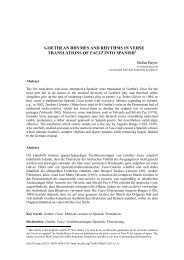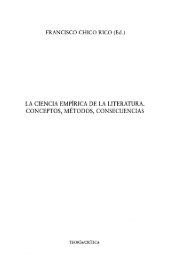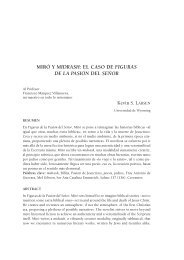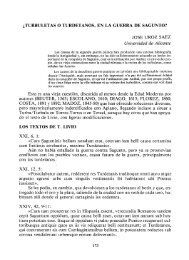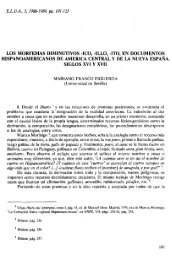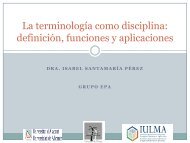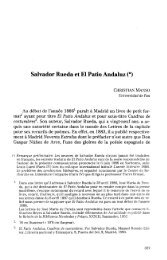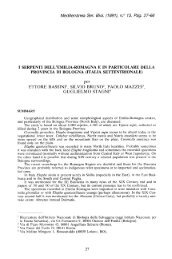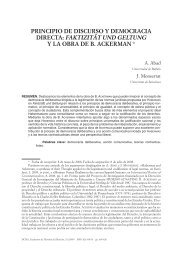Conceptual Metaphors in Taboo-Induced Lexical Variation
Conceptual Metaphors in Taboo-Induced Lexical Variation
Conceptual Metaphors in Taboo-Induced Lexical Variation
Create successful ePaper yourself
Turn your PDF publications into a flip-book with our unique Google optimized e-Paper software.
<strong>Conceptual</strong> <strong>Metaphors</strong> <strong>in</strong> <strong>Taboo</strong>-<strong>Induced</strong> <strong>Lexical</strong> <strong>Variation</strong> 63<br />
example, SEX IS WAR, already discussed, SEX IS FOOD or SEX IS A GAME (cf. Crespo<br />
Fernández, 2008). The verb die is lexicalized with a sexual mean<strong>in</strong>g <strong>in</strong> the OED2 as “To<br />
experience a sexual orgasm (most common as a poetic metaphor <strong>in</strong> the late 16th and 17th<br />
cent)”. The greater ambiguity of this substitute <strong>in</strong> the reference to the taboo concept than<br />
other conventional X-phemistic units derives from the fact that this metaphorical term, and<br />
others <strong>in</strong>cluded <strong>in</strong> the same conceptual network, was commonly employed, as the OED2<br />
states, as a poetic metaphor <strong>in</strong> literature to deal with sexual issues, 11 and the sexual<br />
mean<strong>in</strong>g of the verb die has become obsolete <strong>in</strong> modern usage (cf. Ayto 2007: 80).<br />
4.3. <strong>Lexical</strong>ized metaphors and explicit X-phemism<br />
Contrary to novel and most conventional X-phemistic substitutes, the explicit X-phemistic<br />
alternative undoubtedly refers to the taboo referent it stands for. Explicit X-phemistic<br />
words reached the last stages <strong>in</strong> the process of lexicalization of metaphorical units, after<br />
which the lexical unit is deprived of its capacity to refer figuratively to the taboo due to its<br />
close association � not to say identification � with the sexual concept that it names. When<br />
this happens, the metaphorical units become ta<strong>in</strong>ted and thus require replacement. There<br />
are many examples of words which have undergone this process of lexicalization <strong>in</strong> the<br />
sexual taboo, which has led to polysemy whereby the taboo and non-taboo senses coexist.<br />
Though the taboo sense usually becomes more prom<strong>in</strong>ent and tends to leave out the literal<br />
sense of the word, not many polysemous words have totally lost their orig<strong>in</strong>al mean<strong>in</strong>g. 12<br />
This expla<strong>in</strong>s why the ambiguity of these words tends to disappear gradually over time. As<br />
Allan and Burridge (1991: 23) put it, “[t]here is wealth of evidence that where a language<br />
expression is ambiguous between a taboo sense and a non-taboo sense, its mean<strong>in</strong>g will<br />
often narrow to the taboo sense alone”. Take, for example, the word cock to refer to the<br />
sexual male organ. This coarse word, orig<strong>in</strong>ally an animal metaphor with the mean<strong>in</strong>g of<br />
‘adult male chicken’ 13 , was first used with a sexual sense (‘penis’) <strong>in</strong> the early seventeenth<br />
century (OED2). This once metaphorical term has taken on sexual connotations as a<br />
consequence of its frequent use to refer to the sexual male organ, and cock is now regarded<br />
by the OED2 as “the current name [sc. for penis] among the people, but pudoris causa, not<br />
admissible <strong>in</strong> polite speech or literature”. Consider the follow<strong>in</strong>g example:<br />
(8) Next time you want to get your cock <strong>in</strong>to me, Leo, why don’t you leave kid sister at<br />
home? (BNC: FNT, 4301)<br />
The lexicalized metaphorical term cock does not offer an alternative way of<br />
comprehend<strong>in</strong>g reality. In fact, granted that nobody would th<strong>in</strong>k of a connection of cock<br />
with a male domestic fowl <strong>in</strong> the example above, this word is unable to frame the taboo<br />
topic <strong>in</strong> a particular conceptual sphere and consequently does not provide a particular way<br />
of understand<strong>in</strong>g (or mitigat<strong>in</strong>g) the sexual concept. The term does provide a way to refer<br />
to the tabooed body part <strong>in</strong> a colloquial register like that of (8), but not to reason about it,<br />
as happens <strong>in</strong> conceptual categorization. Indeed, <strong>in</strong> the case of cock, it is the sexual organ<br />
that first comes to m<strong>in</strong>d.





